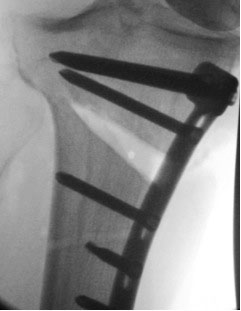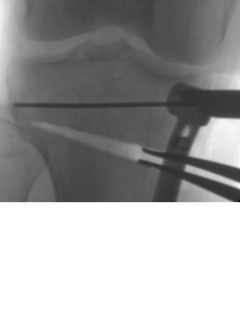A realignment osteotomy realigns the long bones where they are abnormally bowed or knocked to improve the distribution of forces through the joint.

This is an 'opening-wedge' osteotomy, where the surgeon has cut into the bone and prised it into a better alignment, which is then fixed with a plate and screws until the bone is healed in the new position.

Before the plate is applied, laminar spreaders force the wedge open. The amount is opening will have been calculated from computerised imaging assessments before the procedure.

Illustration of the plate and screws holding the wedge open.
Symptoms related to abnormal limb alignment
This is really a procedure that aims to defer or prevent a later knee replacement in a young person with signs of early arthritic change on one side of the knee. So pain is usually the main symptom, but the pain is usually coming from one half of the knee, very often because of an old damaged meniscus shock absorber on the one side. By realigning the limb, the forces through the knee can be adjusted so that the healthy side takes more of the load, sparing the problem side from further degradation.
When would one consider realignment osteotomy?
Although the age of patients having such a procedure is creeping up, this is usually considered a procedure for mid-age adults who are still active and do not want to be tied to having a metal prosthesis which may need revision surgery every few years because of loosening or wear.
Techniques of realignment osteotomy in the knee
The procedure has the advantage of improving pain and function of the knee without the surgery actually involving the knee joint itself, as the bone cuts are made either above or below the knee joint. A wedge may be opened up ('opening-wedge') or a wedge may be removed ('closing-wedge') and the new alignment of the limb fixed with plates and sometimes bone grafts until the bone has healed in the new position. The plates may later be removed.
How long is recovery from realignment osteotomy?
Early recovery is a few weeks, and the patient will need to be on crutches for most of this time. Symptoms tend to get better for quite some time, though.
Types of osteotomy -
More details -
- High tibial osteotomy
- Distal femoral osteotomy
- Bilateral osteotomy
- Double-level osteotomy
- Rotational osteotomy
Expert views -
 2018 - Knee Alignment and Complex Osteotomies - by Professor Adrian Wilson (Knee Surgeon)
2018 - Knee Alignment and Complex Osteotomies - by Professor Adrian Wilson (Knee Surgeon)
 2010 - Realignment osteotomy for knee pain - by Professor Adrian Wilson (Knee Surgeon)
2010 - Realignment osteotomy for knee pain - by Professor Adrian Wilson (Knee Surgeon)
 2018 -
2018 -